Have you ever felt like your voice doesn’t matter when dealing with telecom companies? You’re not alone. In India, where mobile networks are as essential as morning chai, getting stuck in a loop of unresolved complaints can feel like shouting into a void. But what if I told you there’s a way to fight back? Enter TAFCOP—the Telecom Analytics for Fraud Management and Consumer Protection portal. It’s designed to empower consumers like you to report issues and hold telecom providers accountable. But what happens when even TAFCOP doesn’t seem to work? Can you take legal action if your complaint falls on deaf ears? Let’s dive in.
The short answer is yes, you can take legal action if a telecom provider fails to act on your TAFCOP complaint. However, the process isn’t as straightforward as filing a police report. It involves understanding your rights, following specific steps, and knowing when to escalate the matter. In this blog, we’ll explore everything you need to know about taking legal action, from the basics of TAFCOP to the nitty-gritty of filing a case. So, grab a cup of coffee, and let’s get started
Can I take legal action if a telecom provider fails to act on my TAFCOP complaint?(Quick Answer)
Yes, you can take legal action if a telecom provider fails to act on your TAFCOP complaint. Start by filing a complaint on the TAFCOP portal. If unresolved, escalate it to the Telecom Regulatory Authority of India (TRAI) or consumer courts. Legal action can include filing a case in the District Consumer Disputes Redressal Commission for compensation or other remedies.
What Is TAFCOP, and How Does It Work?
TAFCOP, or Telecom Analytics for Fraud Management and Consumer Protection, is a portal launched by the Department of Telecommunications (DoT) in India. It’s designed to help consumers track and manage their mobile connections, report issues like unsolicited calls or SMS fraud, and ensure telecom providers adhere to regulations. Think of it as your digital watchdog in the telecom world.
Here’s how it works: You log in to the TAFCOP portal, register your complaint, and the system forwards it to the concerned telecom provider. The provider is then expected to resolve the issue within a specified timeframe. Sounds simple, right? But what happens when they don’t? That’s where things get tricky.
Why Would a Telecom Provider Ignore a TAFCOP Complaint?
Telecom providers might ignore TAFCOP complaints for several reasons. Sometimes, it’s sheer negligence or a lack of proper systems to address consumer grievances. Other times, it could be deliberate—especially if the complaint involves financial fraud or service disruptions that the provider doesn’t want to acknowledge.
For example, imagine you’ve been charged for a premium SMS service you never subscribed to. You file a complaint on TAFCOP, but the provider brushes it off, claiming it’s a “technical error.” Frustrating, isn’t it? This is where understanding your rights becomes crucial.
What Are Your Rights as a Telecom Consumer in India?
As a telecom consumer in India, you have several rights protected under the Consumer Protection Act and TRAI regulations. These include the right to:
- Transparent billing (no hidden charges).
- Quality service (no dropped calls or poor network).
- Privacy (no unsolicited calls or messages).
- Redressal of grievances (timely resolution of complaints).
If a telecom provider violates these rights, you have the legal grounds to take action. For instance, if your TAFCOP complaint about unauthorized charges goes unresolved, you can escalate it to higher authorities or even file a case in consumer court.
How to Escalate a TAFCOP Complaint
If your TAFCOP complaint isn’t resolved, don’t lose hope. Here’s what you can do:
- Contact the Telecom Provider Directly: Sometimes, a direct call or email to the provider’s customer care can work wonders.
- File a Complaint with TRAI: If the provider still doesn’t act, escalate the issue to TRAI using their online grievance redressal portal.
- Approach Consumer Courts: As a last resort, you can file a case in the District Consumer Disputes Redressal Commission.
For example, let’s say you reported a billing discrepancy on TAFCOP, but the provider ignored it. After escalating to TRAI, they still didn’t resolve it. In this case, you can file a consumer court case seeking compensation for the inconvenience caused.
What Legal Actions Can You Take?
Legal action against a telecom provider can take several forms, depending on the issue. Here are some common options:
- Filing a Case in Consumer Court: You can seek compensation for financial losses, mental agony, or service deficiencies.
- Approaching the National Consumer Helpline: They can mediate between you and the provider.
- Filing a Police Complaint: If the issue involves fraud or criminal activity, such as SIM card cloning, you can file an FIR.
For instance, if your TAFCOP complaint about unauthorized SIM card activation goes unresolved, you can file a police complaint for identity theft and a consumer court case for damages.
What Evidence Do You Need to Support Your Case?
To strengthen your case, gather the following evidence:
- Screenshots of your TAFCOP complaint and follow-ups.
- Call recordings or emails with the telecom provider.
- Bills or statements showing discrepancies.
- Any other relevant documents, such as police complaints or TRAI responses.
For example, if you’re disputing unauthorized charges, provide copies of your bills highlighting the discrepancies and proof that you reported the issue on TAFCOP.
How Long Does the Legal Process Take?
The legal process can vary depending on the complexity of the case and the court’s workload. Consumer court cases typically take 6 months to 2 years to resolve. However, simpler issues resolved through TRAI or the National Consumer Helpline might take a few weeks.
For example, a straightforward case about unsolicited SMS might be resolved quickly, while a complex fraud case could take longer
What Compensation Can You Expect?
Compensation depends on the nature of the issue and the evidence you provide. It can include:
- Refund of unauthorized charges.
- Compensation for mental agony or harassment.
- Penalties imposed on the telecom provider.
For instance, in one case, a consumer received ₹10,000 as compensation for mental harassment caused by unsolicited calls.
FAQs
1. Can I file a TAFCOP complaint for any telecom issue?
Yes, you can file a TAFCOP complaint for issues like billing errors, unsolicited calls, or poor network quality.
2. Is there a fee for filing a consumer court case?
The fee varies depending on the compensation amount you’re seeking. It’s usually nominal.
3. Can I take legal action without filing a TAFCOP complaint?
Yes, but filing a TAFCOP complaint strengthens your case by showing you followed due process.
4. What if the telecom provider settles after I file a case?
You can withdraw the case if you’re satisfied with the settlement.
Conclusion
Taking legal action against a telecom provider for ignoring your TAFCOP complaint is not only possible but also your right as a consumer. While the process may seem daunting, understanding your rights and following the proper steps can make a significant difference. Whether it’s escalating the issue to TRAI or filing a case in consumer court, remember that you have the power to hold these companies accountable.
So, the next time your telecom provider brushes off your complaint, don’t just sit back. Take action, and let them know that your voice matters. After all, in a country where mobile networks are the lifeline of communication, you deserve nothing but the best service.
“Consumer rights are not just laws; they are the voice of fairness in a world of transactions.”

